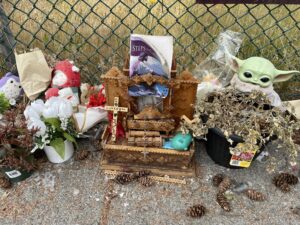I had not always known a great deal about Filipino culture, but about three years ago, when I started seeing my partner Jaime, my learning process began. Jaime comes from a long descent of Filipino heritage, and we try to make a point of going to most of the events and festivals in Vancouver and Victoria that honour that heritage. Up until recently, Jaime lived in Vancouver, and in late April, he informed me that the Lapu-Lapu festival would be happening—right in his neighborhood, no less—and we made our plans to go.
The Lapu-Lapu Day festival in the city is fairly new; it started in 2023 and was originally a small parade down Joyce Street and Collingwood Street, and has turned into a full-day celebration, drawing thousands of people who recognize this day as a chance to let go, have fun, and eat a ton of amazing food. It’s a celebration of cuisine and music, of dancing and bright colours. However, it’s also about honouring something deeper.

Named after the Visayan warrior who fought against Spanish colonization, the festival has become a symbol of cultural resistance and renewal, and it’s a major celebration in Vancouver’s Filipino community. It’s a day where assimilation can be forgotten and the true vibrancy of this culture can be seen. There are an estimated 174,280 Filipinos in British Columbia, and most are concentrated in the Lower Mainland. Lapu-Lapu day becomes much more than a party to them. It is a day of reclamation.
As we walked down Fraser Street the day of the festival this year, we could hear the pulsing of the music before we could see any of it happening. Soon we were in a crowd of people. It was hard to walk. There were families and couples of all sorts lining up at different food trucks. There were food vendors shouting out to people to come try what they were offering, but no one was in competition. Above everything there was laughter. We watched a man standing in front of a booming speaker which was playing “Celebration.” He was encouraging people to dance with him, and more and more people started to join him and dance his steps. I might have thought it was corny any other day, but it was impossible not to watch and grin at this impromptu flash mob. Those who weren’t dancing were watching and clapping their hands to the music. There was joy being served everywhere.
After eating so much that we thought we might not make the walk home, Jaime and I left, the music and laughter echoing behind us. We settled inside his apartment, and were in the process of relaxing for the evening, when Jaime got a phone call from a friend of his. This friend wanted to see if we were alright. In fact, he said he wanted to see if we were “alive.” He had seen a news clip online that said a car drove through the festival, hitting over a dozen people. His friend said disbelievingly, and shakily, “There’s people who have died. I wanted to make sure it wasn’t you.”
As Jaime and I watched the news, and registered what had happened not even 90 minutes after we left the festival, we couldn’t believe how such a wonderful day could end in such chaos. A black car hurtling through the street, smashing into people right and left. A young man running from the vehicle and being restrained by bystanders until police arrived. I still cannot forget the expression in that young man’s eyes—because there was no real expression at all. He was a person who had lost himself a long time ago. At least that’s how he looked to me.
The Filipino-Canadian community, already bonded through shared heritage, have now had to come together through vigils and prayer.
Vigils have been held not only in Vancouver, but across Canada. Grief isn’t picky about municipal lines or people it seizes. This tragedy has been felt everywhere. The Lapu-Lapu festival, a day intended to honour ancestral bravery, became a day to remember the bravery in collective vulnerability. It became a day to discover how to find connection in times of loss.

